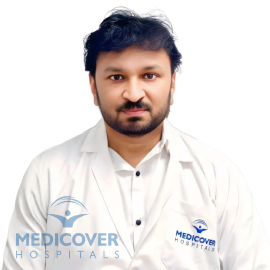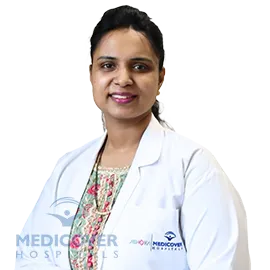Best Ophthalmology Hospital in India
Get expert eye care at Medicover Hospital, one of the top eye hospitals in India. Our skilled doctors use the latest technology to treat eye problems like cataracts, poor vision and retina issues. From LASIK to advanced surgeries, we offer safe and trusted care to help you see better and live better.
3.5k+
Successful Surgeries
95%
Patient Satisfaction
24/7
Emergency Care
Book Your Consultation
Advanced Eye Treatments We Treat
At Medicover Hospital, our expert eye specialists provide advanced treatment for all major eye conditions using the latest tools and technology. Whether it's retina issues, glaucoma, cornea problems or vision correction, we focus on safe, accurate care with better outcomes.Our ophthalmology department is fully equipped with advanced diagnostic and surgical systems to provide top-quality care across all age groups.
Cataract Surgery
Medicover is considered among the best hospitals for cataract surgery in India. We use minimally invasive phacoemulsification and laser-assisted techniques for fast recovery and clearer vision.
- Same-day discharge
- No stitches or bandages
- Top-quality IOLs (Intraocular Lenses)
LASIK & Refractive Eye Surgery
Our ophthalmology team specialises in LASIK, SMILE and Contoura Vision. With over 15,000+ successful LASIK procedures, we’re a top choice for eye hospitals with LASIK surgery in India.
- Blade-free Femto LASIK
- Quick recovery
- Suitable for myopia, hyperopia & astigmatism
Diabetic Retinopathy Treatment
Worried about diabetes affecting your eyes? Our experts specialise in diagnosing and treating diabetic retinopathy at early and advanced stages.
- Laser photocoagulation to prevent vision loss
- Anti-VEGF injections to reduce swelling
- Vitrectomy for severe cases with bleeding or scarring
Contoura Vision Surgery
Retina & Glaucoma Care
Medicover is one of the best retina specialist hospitals in India, providing advanced care for diabetic retinopathy, macular degeneration, retinal detachment and glaucoma.
- OCT, Fundus Fluorescein Angiography (FFA)
- Anti-VEGF injections
- Minimally invasive glaucoma surgery
Types of Eye Conditions We Treat at Medicover Hospital
At Medicover, our expert ophthalmologists in India provide advanced care for a wide range of eye conditions, from common vision problems to complex eye diseases. With modern diagnostic tools and personalised treatments, we ensure clearer vision, healthier eyes and better quality of life for our patients.
Refractive Errors
We treat common vision problems like nearsightedness (myopia), farsightedness (hyperopia), and astigmatism. Treatment options include prescription glasses, contact lenses and advanced procedures like LASIK to correct your vision.
Cataracts
Cataracts cause cloudy or blurred vision. We offer advanced cataract surgery where the cloudy lens is replaced with a clear artificial one, helping restore clear sight.
Glaucoma
Glaucoma is a condition where high pressure in the eye can damage the optic nerve and lead to vision loss. We manage it with eye drops, laser therapy or surgery to reduce pressure and protect your eyesight.
Retinal Disorders
We treat serious conditions like diabetic retinopathy, macular degeneration and retinal detachment. Our retina specialists use lasers, injections and surgeries to preserve vision and prevent further damage.
Corneal Diseases
Conditions like keratoconus, corneal ulcers and infections affect the front part of the eye. We offer medical treatments, cross-linking and corneal transplant procedures if needed.
Pediatric Eye Problems
We care for children's eye issues like lazy eye (amblyopia), crossed eyes (strabismus) and congenital vision defects. Early diagnosis and treatment help prevent long-term vision problems.
Dry Eye Syndrome
Dry eyes can cause burning, itching and blurred vision. We provide lubricating eye drops, tear duct treatments and lifestyle solutions to relieve symptoms and improve comfort.
Eye Infections & Allergies
From pink eye (conjunctivitis) to eyelid inflammation and allergic reactions, we treat a range of eye infections with the right medications and hygiene advice to prevent recurrence.
Eye Injuries & Trauma
We handle all kinds of eye injuries, including foreign objects in the eye, scratches, burns or chemical exposure. Immediate care helps prevent complications and protect vision.
Neuro-Ophthalmic Disorders
These are vision problems linked to the brain or nerves such as optic neuritis or double vision. Our specialists coordinate with neurologists for effective diagnosis and treatment.
Top Ophthalmology/Eye specialist in India
At Medicover, our team includes some of the top ophthalmologists in India. We offer advanced care for vision problems and complex eye conditions. Our experts specialise in cataract, glaucoma, corneal disorders, retinal diseases and laser vision correction to ensure precise treatment and improved eye health for patients of all ages.
Diagnostic Services for Eye Treatment
At Medicover Hospital, we use advanced diagnostic tools to detect and monitor a wide range of eye conditions accurately. Early and precise diagnosis helps us offer the best treatment for healthy vision.
Visual Acuity Test
Measures how well you see at different distances using reading charts.
Refraction Test
Helps determine your exact eyeglass or contact lens prescription.
Slit-Lamp Examination
A special microscope that lets our doctors examine the front parts of the eye like the cornea, iris and lens.
Tonometry (Eye Pressure Test)
Checks for high eye pressure, which is a major sign of glaucoma.
Fundus Photography
Takes detailed images of the retina, optic nerve and blood vessels at the back of the eye.
Optical Coherence Tomography (OCT)
A non-invasive scan that provides detailed cross-sectional images of the retina, useful in conditions like macular degeneration and diabetic retinopathy.
Visual Field Test
Measures your side (peripheral) vision, helping detect glaucoma or nerve damage.
Corneal Topography
Creates a map of the shape and surface of your cornea and is used for LASIK evaluation and keratoconus diagnosis.
Pachymetry
Measures the thickness of your cornea to assess risks for glaucoma or before LASIK surgery.
Dilated Eye Exam
Involves using special drops to widen the pupil for a thorough check of the retina and optic nerve.
Benefits of Advanced Technology for Ophthalmology Treatments
-
Early and precise detection of eye diseases with advanced imaging and diagnostic tools.
-
Personalised treatment plans for effective management of vision and eye health conditions.
-
Minimally invasive eye surgeries like LASIK and cataract procedures ensure faster recovery.
-
Higher success rates in complex ophthalmic treatments with modern surgical technology.
-
Reduced risks, enhanced safety and improved long-term vision outcomes.
Technology Success Rate
Diagnostic accuracy with our advanced imaging and AI technology
Our Promise to You
Safety First
We use trusted technology and follow strict safety rules to make sure every eye treatment is safe and protects your vision.
Compassionate Care
Our doctors and staff guide, support and care for you at every step to make your eye treatment comfortable and reassuring.
Timely Diagnosis & Treatment
We provide 24/7 eye care with fast diagnosis and treatment, so your vision is protected and complications are prevented at all times.
Your Health is Our Priority
At Medicover, your eyes are always cared for with safety and trust. Our expert eye specialists use advanced technology to provide clear and healthy vision. We focus on timely treatment, comfort and personal care, ensuring you feel supported at every step.
Available 24/7 for Emergency Cases

Why Choose Medicover Ophthalmology?
At Medicover, we bring together expert ophthalmologists, advanced diagnostic technology and personalised care to deliver world-class eye treatments. Recognised as one of the best hospitals for ophthalmology in India, we focus on restoring vision, preventing complications and enhancing quality of life through safe and effective eye care solutions.
Expert Eye Doctors
Our eye specialists are trained in India and abroad. They treat all types of eye problems, from retina and cornea issues to glaucoma, children's eye care and LASIK surgery.
Advanced Technology
We use the latest tools like Femto LASIK and laser systems to ensure safer surgeries and quicker recovery.
Personalized Care
Every patient receives a personalised treatment plan tailored to their unique needs.
Certified Safe Hospital
Medicover is NABH-accredited, which means we follow the highest safety and quality standards.
Affordable & Insurance-Friendly
We offer clear, transparent prices and accept most major health insurance plans for cashless treatment.
Patient Success Stories
Real experiences from patients who regained their mobility and quality of life
I had cataract surgery at Medicover and it was smooth and painless. The doctors explained everything clearly and my vision is much better now. Truly the best ophthalmology hospital in India.
Divya Kapoor
Chennai
I visited for LASIK surgery. The team was professional and caring. My eyesight is perfect and the recovery was quick. Highly recommended for eye care.
Karthik Rao
Warangal
I had severe dry eye and irritation for months. Dr. Priyanka (Gaikwad) Bhat at Medicover Hospitals, Nashik treated me correctly. My eyes feel healthy and comfortable now.
Arjun Menon
Nashik
My child had lazy eye treatment here. The doctors were very gentle and patient. The staff guided us through every step. I feel grateful for their care.
Anjali Singh
Bangalore
Still have questions? Speak with our experts now!
040-68334455Frequently Asked Questions
We treat a wide range of eye problems including cataracts, glaucoma, retinal issues, corneal diseases, dry eyes, diabetic eye conditions, squint and more.
Medicover uses the latest technology like femto-laser for cataract surgery, bladeless LASIK, OCT, fundus imaging, advanced microscopes and retina lasers for accurate diagnosis and safe treatments.
Yes, Medicover Hospitals provide 24/7 emergency eye care services for injuries, sudden vision loss, eye infections, and other urgent problems.
Yes. We offer affordable eye care packages and also support cashless insurance with major health insurance providers.
You can book an appointment by calling the hospital directly, visiting the Medicover hospital or Online booking is quick and easy.


























